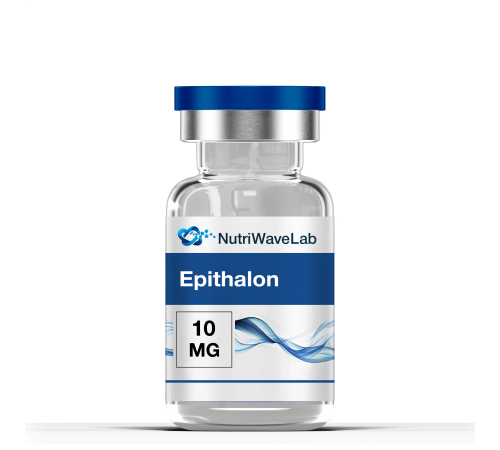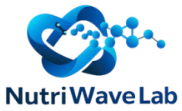
Epithalon (Epitalon) is a peptide developed by Russian scientists, known for its anti-aging properties. It consists of a short amino acid sequence (Ala-Glu-Asp-Gly) and works by activating the enzyme telomerase, which plays a key role in maintaining the length of telomeres in DNA. This mechanism helps slow down the aging process by extending the life cycle of cells.
Key Effects and Benefits:
• Telomere Extension: Epitalon activates telomerase, promoting the elongation of telomeres, which is crucial for prolonging the life of cells and slowing down aging.
• Anti-Aging: The peptide can decelerate age-related changes, reduce symptoms of atherosclerosis, and enhance cognitive functions regardless of age.
• Anti-Cancer Activity: In animal models, Epitalon has demonstrated anti-cancer properties, making it a promising candidate for further research in cancer prevention.
• Melatonin Regulation: Like epithalamin, Epitalon increases melatonin production by the pineal gland. Studies in elderly monkeys and humans have shown that Epitalon significantly improves nighttime melatonin secretion—up to 500 times more effectively than epithalamin.
• Normalization of Neurotransmitters: Epitalon helps regulate the circadian rhythms of norepinephrine and dopamine production in the hypothalamus, which improves overall well-being and sleep patterns.
________________________________________________________________________________________________________________________________________________________________________________________________
Amino Acid Sequence: Ala-Glu-Asp-Gly
Molecular Formula: C14H22N4O9
Molecular Weight: 390.349 g/mol
________________________________________________________________________________________________________________________________________________________________________________________________
Study: Epitalon and Vision
Research involving rats with retinitis pigmentosa demonstrated that Epitalon improved visual outcomes in 90% of cases. The peptide not only helped maintain the structural integrity of the eye but also enhanced the bioelectrical function of the retina, which is critical for vision. These effects are promising for further exploration in treating retinal disorders like retinitis pigmentosa, which often leads to progressive vision loss.
Additional studies have shown that Epitalon has minimal side effects and good bioavailability when administered subcutaneously. It also supports circadian regulation by influencing melatonin production, which could contribute to its overall neuroprotective and vision-preserving properties. While animal models have shown significant improvement in retinal function, further research is required to confirm these results in human trials.
This data positions Epitalon as a potential therapeutic option for degenerative eye conditions, although more clinical studies are needed to fully validate its efficacy.
Study: The Role of Telomerase in Epitalon’s Anti-Aging Effects
Early studies on insects and rodents have shown that Epitalon can significantly extend lifespan. For example, in normal, healthy flies and rats, Epitalon reduced mortality by 52%. In mice prone to heart disease and cancer, the peptide increased lifespan by 27% compared to control groups.
Part of the explanation for these effects lies in Epitalon’s ability to neutralize free radicals, which are charged molecules that damage healthy tissues. However, the antioxidant action alone does not fully explain Epitalon’s life-extending properties. There is strong evidence from in vitro experiments on human somatic cells that Epitalon activates the enzyme telomerase.
Telomerase plays a crucial role in protecting telomeres, the ends of chromosomes that are vital for maintaining DNA health. By activating telomerase, Epitalon reduces the number of errors in the DNA sequence, thus supporting the idea that it protects DNA from damage. In short, Epitalon helps safeguard DNA from accumulating errors over time, a process that ultimately leads to cell dysfunction, aging, and, in some cases, cancer.
Epitalon and DNA Activation: Mechanisms Behind Longevity
Epitalon’s ability to extend lifespan is not solely due to its antioxidant effects or telomere protection. Researchers have uncovered additional mechanisms that involve Epitalon’s influence on gene expression. Studies show that Epitalon can directly interact with DNA, helping regulate the activity of genes that play key roles in immune function and cellular repair.
Gene Regulation and Cellular Health
Epitalon has been observed to enhance the expression of certain genes that impact the body’s ability to repair tissue and maintain immune health. By influencing these genetic pathways, Epitalon supports the regeneration of cells and tissues, contributing to overall longevity and resilience against age-related damage.
Immune Function Support
One of the notable effects of Epitalon is its ability to enhance the production of gamma-interferon, a critical molecule that activates immune responses, including the action of macrophages and T-cells. This immune-boosting property helps the body defend against infections and repair tissue more effectively.
Telomerase Activation and DNA Protection
Additionally, Epitalon’s activation of telomerase helps protect the telomeres, which are the protective caps on the ends of chromosomes. By maintaining telomere length, Epitalon plays a crucial role in preventing cellular aging and ensuring that DNA remains healthy and functional over time.
In summary, Epitalon promotes longevity not just through antioxidant activity or telomere maintenance, but by optimizing gene expression that supports immune function, tissue repair, and cellular protection. This multifaceted approach helps explain why Epitalon is a promising agent in anti-aging research.
Epitalon and Tumor Suppression: A Potential Cancer Treatment
Research has shown that Epitalon, when administered daily, may slow tumor growth and inhibit metastasis, making it a promising candidate for cancer therapy. Studies in animal models, particularly in rats, demonstrated that Epitalon not only reduces tumor size but also prevents cancer from spreading to distant organs. These findings have generated interest in using Epitalon to treat HER-2/neu-positive breast cancers, as well as certain types of leukemia and testicular cancer.
One mechanism that may explain Epitalon’s anti-tumor properties is its activation of the PER1 gene, which regulates circadian rhythms and cellular functions. PER1 is often underexpressed in cancer patients, and restoring its expression may help slow the progression of established tumors. Moreover, research suggests that increasing PER1 levels can enhance the effectiveness of radiation therapy, making cancer cells more sensitive to radiation. This allows for lower radiation doses, reducing immediate side effects and potentially minimizing the risk of secondary cancers that can result from high-dose radiation treatments.
By influencing gene expression, boosting immune response, and regulating circadian rhythms, Epitalon shows potential as a multifaceted approach to cancer treatment, though more human studies are needed to fully understand its efficacy and safety.
Epitalon and Skin Health: Enhancing Regeneration and Anti-Aging
Epitalon has been shown to positively influence MMP2, a protein critical to the maintenance of connective tissue such as skin. MMP2 plays a key role in breaking down and remodeling the extracellular matrix, including important structural components like collagen and elastin. Studies in rodents indicate that Epitalon not only activates the MMP2 gene but also stimulates fibroblasts—cells responsible for producing and maintaining collagen, elastin, and other components of the extracellular matrix. In mice treated with Epitalon, there was a 30-45% increase in fibroblast activation, which suggests that this peptide can help accelerate wound healing and counteract the natural degradation of skin structure and integrity associated with aging.
Furthermore, Epitalon reduces the activity of caspase-3, an enzyme involved in programmed cell death (apoptosis). By lowering caspase-3 activity, Epitalon helps protect fibroblasts and other skin cells from premature death, allowing them to remain functional and healthy for longer periods. This effect contributes to the preservation of skin elasticity, strength, and youthful appearance, making Epitalon a promising agent in anti-aging skincare and wound healing therapies.
Product Use: THIS PRODUCT IS STRICTLY FOR SCIENTIFIC RESEARCH PURPOSES ONLY. It should only be used in laboratory settings. All product information on this website is provided solely for educational purposes. The law strictly prohibits introducing this product into the body of humans or animals. Only licensed professionals should handle this product. This product is not a drug, food, or cosmetic and should not be improperly classified or used as such.
There are no reviews for this product.
No questions about this product.
